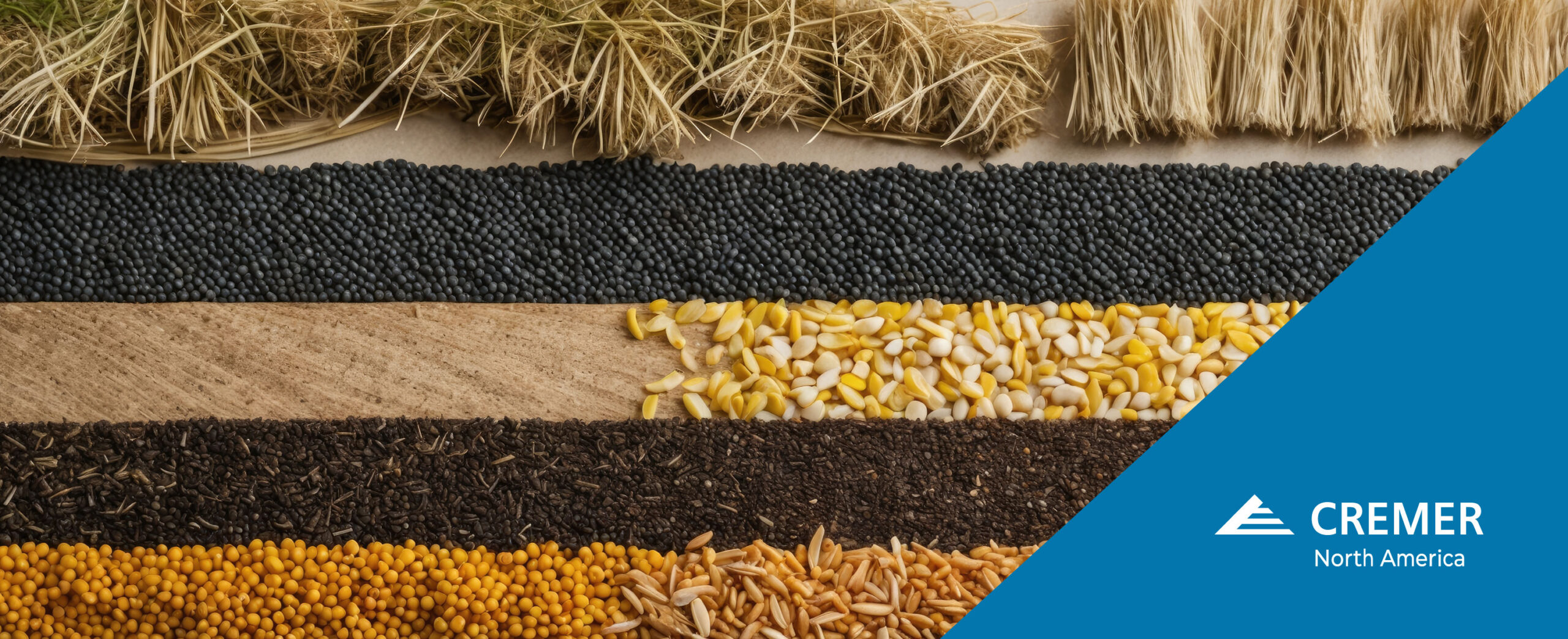Green Ingredients for Agriculture

Agriculturalists know the sustainability of their land and their products contributes to their ongoing success. Farmers play the long-game every day, and they need their products to do the same. Oleochemicals like fatty acids, glycerin, and esters can improve agricultural products while promoting sustainability from the source.
Speak with a representative about how CREMER North America can help you switch to oleochemical ingredients in animal feed or sprayables.
Oleochemicals for Agricultural Uses
Oleochemicals make ideal replacements for petrochemical or synthetic ingredients within agricultural products like animal feeds and sprayable treatments for weeds and other invasive plants. These biodegradable, sustainable, and hard-working chemicals come from plant or animal sources, so they are much safer to use in the presence of humans and animals.
When used in animal feeds, oleochemicals can increase the nutritional value of the existing feed, which has measurable effects in byproducts like milk and meat. When used in sprayables, oleochemicals can increase the solvency of primary ingredients, making them more effective, even on tough-growing weeds.
What Oleochemicals Are Used in Animal Feeds?
Fatty acids are the primary oleochemicals used as an additive for animal feeds. These compounds are measured by the size of their carbon chains, and farmers can use different chain lengths for the outcomes they need.
| Common name | Chemical name | Purpose as ingredient |
| Oleic acid | C18H3402 | Healthy body composition |
| Stearic acid | C18:0 | More milk and milk solids |
| Alpha linoleic acid | C18H3002 | Increased fertility, body weight, milk production |
| Palmitic acid | C16:0 | Increased milk and milk fat, keeps up with the demands of a lactating cow |
| Octodeconic acid | C18:1 | Increased milk and milk fat, keeps up with the demands of a lactating cow |
Farmers and feed chemists often stick with fatty acids that occur naturally in plants, as they are generally safe and do not affect digestion.
In addition to fatty acids, glycerin and other oleochemicals may be added to animal feeds to make them tastier, improve fat content, or increase overall nutrition for animals. CREMER North America supplies, blends, and dilutes sustainably-sourced fatty acid and glycerin formulations for animal feeds.
Purpose and Benefits of Fatty Acids in Animal Feeds
Fatty acids and other oleochemicals are added to animal feeds to increase the farm’s output at a lower cost for feed. These feed additives increase the ability of animals to take in nutrients from feed, and farmers can choose the mixes that get their desired outcome.
Studies have shown that increasing the linoleic and alpha-linoleic acid within ruminant feed will increase overall body weight and milk output, but there are several other benefits that come from adding fatty acids to animal feeds
Benefits of fatty acids in animal feeds
- Lower cost per feeding session
- More milk per session
- Higher fat content in milk, which is desirable for cream-based products
- More energy availability for animals
Oleochemical ingredient additives lower overall costs for farmers while increasing outcomes across animals. Oleochemicals are easy for the animals to digest, and unused portions of feed degrade in natural ways like the feed itself.
Oleochemicals for Sprayable Agricultural Products
Crop farmers understand that herbicides increase overall crop output and decrease the manual labor needed to maintain fields during the growing season. While farmers may want to stop growth of one type of plant, they don’t want to spoil the soil for future planting.
Herbicides and other sprayable agricultural products use methyl esters as ingredients because they have many benefits, including:
- Increasing the solvency of ingredients
- Penetrating waxy coatings on plants for increased uptake
- Naturally biodegradable
- Low volatile organic compound (VOC) emission
Because these oleochemical ingredients are sustainably sourced and eco-friendly, they help the herbicide do its job, then degrade without adverse effects to the land.
CREMER North America for Agricultural Ingredients
CREMER North America is a world-class supplier of agricultural feed additives and sprayable ingredients with a regional presence. Ask us how we can improve your agricultural product lines with contract manufacturing, transloading, pastillation, and oleochemical supply today.